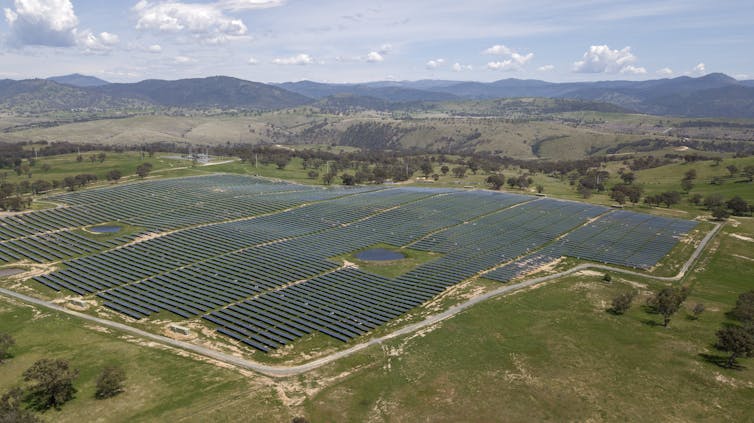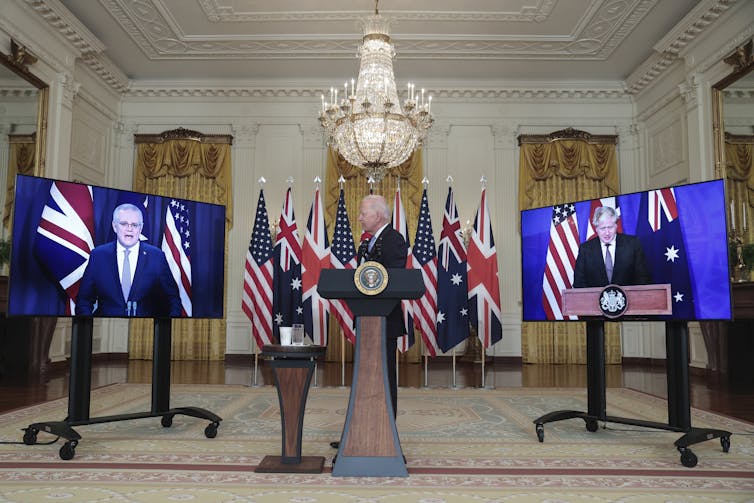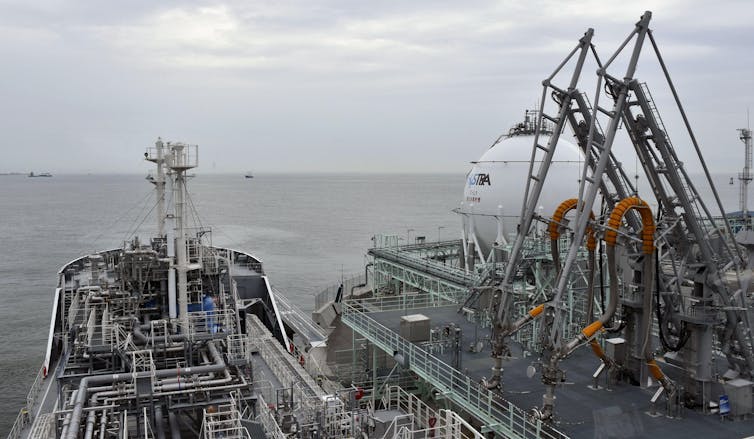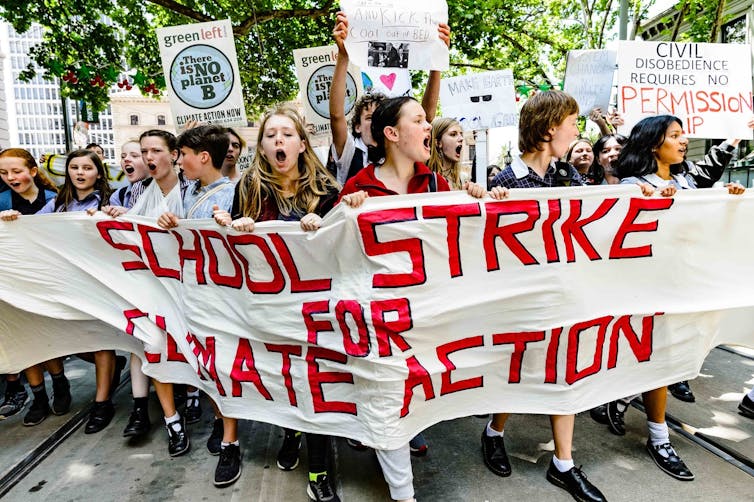By Thomas Wiedmann, Arunima Malik, Glen Peters, Jacqueline Peel & Xuemei Bai*
The world has its best chance yet to reduce greenhouse gas emissions quickly, but hard and fast cuts are needed across all sectors and nations to hold warming to safe levels, the global authority on climate change says.
The Intergovernmental Panel on Climate Change (IPCC) report, released Tuesday, says opportunities to affordably cut global emissions have risen sharply since the last assessment of this kind in 2014. But the need to act has also become far more urgent.
The report is the definitive assessment of how well the world is doing in finding solutions to rising temperatures. We each contributed expertise to the report.
Here, we explain key aspects of the findings and what it means for the world, including Australia.

Earth remains on red alert
- Glen Peters, lead author on mitigation pathways compatible with long-term goals
The report finds the world has made progress on emissions reduction over the last decade. Growth in greenhouse gas emissions slowed to 1.3% per year in the 2010s, compared to 2.1% in the 2000s.
But global emissions remain at record highs. If policy ambition does not ramp up immediately, warming will shoot past 1.5℃ and be well on the way to 2℃ – failing to meet the temperature goals of the Paris Agreement.
Alarmingly, the world’s current policies put us on track for global warming of between 2.2℃ and 3.5℃ within 80 years. It’s far better than the 4℃ or more feared about a decade ago, but still far from consistent with the Paris Agreement.
To have a 50% chance of keeping global warming to 1.5℃ by century’s end, global CO₂ emissions must halve in a decade, reach net zero in the 2050s and go net negative thereafter.
Methane emissions would also have to halve by 2050 in these scenarios.
Halving global emissions by 2030 is viable and achievable, the IPCC says. But it requires an immediate step change in climate policy across all sectors, countries and levels of government.
Rich nations must make the most rapid emissions reductions. This includes Australia, where a plan for net zero emissions by 2050 falls short of the ambition needed and is not yet backed by policy.

More than technology
- Tommy Wiedmann, lead author on emissions trends and drivers
The report is a comprehensive catalogue of what can be done – but has mostly not yet been done – to avert devastating climate change.
Some trends are encouraging. Some 36 countries have successfully cut greenhouse gas emissions over more than a decade.
And opportunities to cut emissions affordably and cheaply have multiplied enormously since 2014, the report finds.
This is largely due to the plunging costs of renewables, which promises emissions reduction beyond the energy sector in areas such as manufacturing and heavy transport. We expand on the options here.
But change is not coming fast enough. The report confirms all energy efficiency gains in the last decade have been more than outpaced by economic and population growth.
Technology is not a silver bullet. To have a chance of halving global emissions by 2030, we must use fewer high-carbon products and adopt less emissions-intensive lifestyles. Like all other changes required, these cannot be incremental, the IPCC says.
Australia is blessed with a bounty of renewable energy resources. Used wisely, it could slash domestic emissions and help reduce other countries’ emissions, in the form of zero-emissions energy exports.

No-one gets left behind
- Arunima Malik, lead author on introduction and framing
In 2016, the United Nations Sustainable Development Goals – an action plan for people, planet and prosperity – came into effect.
Sustainable development meets the needs of the present without compromising future generations. And as the latest IPCC report emphasises, it cannot be achieved without effective climate action.
One Sustainable Development Goal explicitly focuses on tackling climate change. But climate action is linked to all other goals, including those relating to energy, cities, industry, land, water and people.
Emissions reduction policies must be inclusive and avoid unintended consequences such as exacerbating existing poverty and hunger. The transition to a low-carbon world should be equitable and leave no-one behind.
The IPCC report calls for both accelerated climate action and a just transition. This requires well-designed policies at all levels of government, and across all sectors. International co-operation is key.

Is the Paris Agreement working?
- Jacqueline Peel, lead author on international cooperation
This report is the first to assess the Paris Agreement, which took effect from 2020. Under the agreement, countries submit and update pledges on emissions reduction and adapting to the changing climate.
For these pledges to be achieved globally, high-income countries must help other nations by providing finance, access to clean energy technologies, and other assistance and know-how.
The IPCC identified a shortfall in global climate finance. In particular, high-income countries missed their 2020 target to mobilise $US100 billion per year.
The Paris Agreement is a treaty but the pledges are voluntary. Countries set their own targets and can’t be forced to meet them. So, is it working?
According to this new report, it largely is – albeit slowly. For instance, it has encouraged nations such as Australia to make more ambitious emissions pledges.
It has also enhanced transparency, enabling outside groups, such as those in civil society, to assess countries’ progress.
Other international mechanisms, such as global business partnerships and youth climate protests, are also driving change.
But more must be done to halve emissions this decade.
Cities are central
- Xuemei Bai, lead author on urban systems and other settlements
The IPCC report found around 70% of the world’s greenhouse gas emissions are produced in cities and urban areas. This offers both challenges and opportunities for emissions reduction.
To date, more than 1,000 cities worldwide have signed up to net-zero emission goals, including many in Australia.
To fulfil the Paris Agreement, more cities must step up and work towards goals such as 100% renewable energy, zero-carbon transport, decarbonising construction and improving waste management.
Developing countries are rapidly urbanising, which requires new housing and infrastructure. But doing so in a business-as-usual way could lead to substantial new emissions, the IPCC warns.
City leaders must embrace integrated planning and management to meet the climate challenge. This must be achieved while cities continue their important roles in maintaining social, economic and environmental well-being.
We need all hands on deck: businesses, communities, researchers and citizens.
Seize the opportunity
This latest report shows how the choices we make now will determine the fate of generations to come – and all life on this planet.
Humanity has already missed so many opportunities to stabilise Earth’s climate. We now have the chance to right some of those past wrongs.
Only an urgent, concerted effort across all sectors and nations, starting today, will deliver the change needed.
* Annette Cowie, Frank Jotzo, Jake Whitehead and Peter Newman contributed to this article. See part two of the article here.![]()
Thomas Wiedmann, Professor of Sustainability Research, UNSW Sydney; Arunima Malik, Senior Lecturer in Sustainability, University of Sydney; Glen Peters, Research Director, Center for International Climate and Environment Research - Oslo; Jacqueline Peel, Director, Melbourne Climate Futures, The University of Melbourne, and Xuemei Bai, Distinguished Professor, Australian National University
This article is republished from The Conversation under a Creative Commons license. Read the original article.
52 Comments
if these authors funding were conditioned on them talking about manmade climate change is a hoax, they would happily do so.
No , they wouldn't.
Xingmo, are you sure you understood the article above? Your English comprehension seems very low.
It's always risky to project your own morals onto others.
Clearly , we wont get a consensus across all countries to make the changes needed to reduce emissions .... nevertheless , as a nimble economy , we could " do our bit " with a few changes which will allow us to continue with a diversified robust economy ... and which will deny the opportunity for competitors to shame us for inaction ...
"...our bit" is 0.1% of global climate emissions.
As a developed country with an unusual dependence on agricultural production, coupled with a lot of expertise in the sector, NZ is in a prime position to develop technologies and techniques that can be used to reduce farm emissions all over the globe.
I expect that by the end of the century NZ will contribute more to global reduction in emissions than we've emitted ourselves.
We emit 0.1% of the total because we have a low population. Per capita we're about as bad as China.
Per capita is the measure that matters too. It's morally repugnant to expect the poor to make cuts because there are more of them, so that we rich don't have to.
It's more complicated than that. Our emissions are so high per capita because of our huge dairy and sheep/beef footprint, most of the product of which we sell overseas, unlike many other countries. We reduce our footprint, we could end up reducing the world's food supply, which is produced with a very efficient CO2 per unit of protein than many other countries. I.e. we could reduce our emissions per capita by increasing someone else's emission per capita
So kind of the end consumer being responsible for the emissions from what they consume. That's fine, so long as we become responsible for the emissions of everything we import.
Two way street, that one
It is the one way street if you are world's most efficient producer. Look at the methanol and natural gas and strip mined Kalimantan coal debacle. If the virtue signallers have their way farming and aluminium will go the same way. Just like Helen swapped sustainably heli logged rimu for clear felled merbau.
"Chinese private-sector firm Wanhua Chemical earlier this week started up a new coal-based methanol plant at Yantai in Shandong province.
The new plant has a nameplate capacity of 600,000 t/yr and can produce up to 670,000 t/yr of methanol.
Wanhua has mothballed its old, coal-based methanol plant with 200,000 t/yr capacity at the same site."
... we can shine out like a beacon of light with locally developed technologies to reduce our proportionally high per capita emissions ... and hopefully , gain revenues by exporting those solutions around the world ... plus , we can adopt & adapt existing good practices from around the world ... if we dont , our primary produce exporters could be shut out of overseas markets ...
I think NZ's bit is to set itself up as a fully sustainable nation across all sectors whilst maintaining a 1st world quality way of life for all citizens.
Easier said than done but possible, however we all know it'll be a complete mess and only a powerful few will benefit (for the short term anyway).
Free public transport.
Free? I think you mean paid for by someone else. Who do you think that should be?
Council rates will skyrocket beyond what they were going to do.
So it will fall upon house owners, renters and govt accommodation supplements.
Households with multiple public transport commuters in the one household will not escape these additional costs. But may be a little better off. Everyone else (incl electric car owners, pushbike riders etc) for who public transport is just not practical will be way worse off.
Switch all public transport to electric for a start
some of the costs would be offset by reductions because of the policy (e.g, road and parking maintenance)
Like on-street parking?
Moreover, the folk on trains and buses aren't the only ones benefiting from them being on trains and buses.
Only for as long as this cost is offset by something that is not rates. The incompetent clowns at the Auckland Council, for example, have already brought the rates up to extortionate levels, stuff that seems out of a "The Godfather" movie (well, at least these mobsters provided some sort of protection services, and they did not waste heaps of ratepayers money on penpushers, coordinators, middle managers, marketing and communication experts, strategists and all sorts of consultants).
Double the cost of public transport and cut its operation schedule by 50%.
Yeah...er...that'll fix things...
The high cost of fuel definitely has reduced traffic. If the govt was serious about its stated climate emergency it would not have reduced the taxs on petrol and diesel. But I suppose that it wants to be voted in next time and needs something to brag about.
The other one was releasing the emergency stocks. What an absolutely stupid thing to do. You don't use that for anything other than a supply catastrophe. And it really only has a very temporary affect. What then? Prey that oil is not actually curtailed after that?
The other one was releasing the emergency stocks. What an absolutely stupid thing to do. You don't use that for anything other than a supply catastrophe.
We're a member of the International Energy Agency and the 31 member countries agreed to release oil stocks. So we did as was required by that group.
I agree it was stupid, but the fault does not reside with our government. I presume there are benefits to being a member of the IEA or we wouldn't be.
I don’t understand why ipcc aren’t advocating for a reduction in global population? Instead of hoping for a new technology or some money go round trading scheme.
Encouraging people too have two or less children, this could be achieved in a few generations.
Aren’t most western countries already reducing population if not for immigration?
Less people consume less simple!
... the worlds population is only rising due to increasing longevity ... death ain't as popular as it used to be ... the birthrate is at replacement value only in most country's ... India & Nigeria being notable exceptions ...
Good point! So with a goal in mind it shouldn’t be too hard to reduce the global population to a sustainable level in very few generations. We don’t need big families to work the fields and incase a few children die anymore.
And how do you propose doing that? If people want two or fewer children, they already have the means to do so. The rest of us may actually want more children, and surely the best you can offer is some kind of coercive action to prevent us from exercising our bodily autonomy. China, as an autocracy, could and did do it; but such a course of action is obviously incompatible with Western liberal values—perhaps with the exception of the remove of tax credits that increase with the number of children in a household (as we have now). But the corollory would be increased child poverty, which governments of all stripes claim to want to eliminate.
I see it as one of the only true tools available to us currently and no one is talking about it. Covid has proven people aren’t about to change old habits. I certainly don’t want too. So less people seems a good option.
I’m not advocating for regulation but if they were vocal about it then people would be able to make an educated choice. Obviously immigration controls or tax incentives would be an option if it was even on the table.
When people (especially women) have control of their lives and fertility, they choose fewer children, they choose delaying reproduction and some even skip the whole process altogether. There will a few people who would like to have more children, and with everyone else living their lives as they choose, there will be a bit of wriggle room for the few who would like a bigger family. Until we have reduced our number enough to be sustainable, however, there should be no extra reward for those having more.
"Less people consume less simple."
Simply not true. If it were true developed countries wouldn't be consuming the vast majority of resources as they are.
On a basic level the sub-saharan family of ten will consume substantially less than the average westerner in their own.
Consumption is the problem not population.
Yeah. Nah. Population is a problem. Increasing human population is pushing out everything else in this world, even in places where, seemingly, their footprint is not the same as here, it's still there, just in a different form.
While that's true (get rid of the wealthiest 10% on the planet and emissions would halve) it's those countries with very high birthrates in Africa and the Middle East that are going to suffer the most from climate change especially if their populations increase as forecast. Many of those people desire smaller families, but don't have access to contraception, which seems like a very good place to start.
BRANZ states each new house produces 120t carbon over 90 yr life. Ruapehu (google) over 2000 t/day at worst, 650t average = 21 MILLION t +. So maybe we ought to get a sense of proportion. Plus Rotorua, White Island etc. The man made CO2 is miniscule. Sea level rise? - Milford sound was once a glacier. So the sea has come up a bit before.
What about Putin - is he using low carbon bombs? + all the extra carbon rebuilding Ukraine.
And there is coal in Antarctica and whale fossils in the Sahara.
Climate change has always happened. We should live with it, and stop trying to change natural cycles. But don't abuse the planet either.
Analysis of the proportion of different carbon isotopes clearly shows that the rises in CO2 over the last couple of centuries are primarily because of us digging stuff up and burning it. What we are doing is in addition to the natural cycles, and there are a hell of a lot of us doing it these days.
The earth heats and cools as a function of Milankovitch cycles, not CO2. In general after the earth heats up the ocean degasses it's CO2 with a delay of about 800 years.
You cannot reason someone out of a position they did not reason themself into.
well, I have some problems with that article. What's this all about "...But Milankovitch cycles can’t explain all climate change that’s occurred over the past 2.5 million years or so.." what are humans supposed to have done that? lol
"...During past glacial cycles, the concentration of carbon dioxide in our atmosphere fluctuated from about 180 parts per million (ppm) to 280 ppm as part of Milankovitch cycle-driven changes to Earth’s climate..." This is somewhere between misleading and incorrect. 180 ppm was achieved about 20,000 years ago during the peak of the last glaciation. This was the lowest CO2 concentration in last 500 million years, and probably the lowest concentration since the earth was formed 4.6 billion years ago. It was so low that all plant life on earth almost died. Anyway, as the climate warmed out of the last glaciation 10,000 years ago, the earth's ocean released CO2 to bring the concentration to the preindustrial level of 280 ppm. Even the current 412-415 ppm is a lower CO2 concentration that the earth had for most of the time that organic lifeforms have occupied the earth. the CO2 level has regularly been above 2000 ppm for long periods of earth's history. Why is 280 ppm considered as some universal constant because it’s not.
The only thing I agree with in that article is that we're currently in the Holocene interglacial period of the current ice age.
you said that the earth warmed and cooled with Milankovitch cycles and yet we're currently in the "cooling" phase of those...?
https://upload.wikimedia.org/wikipedia/commons/5/53/MilankovitchCyclesOrbitandCores.png
Yes. Broadly speaking we are in an ice age that began 2.6 million years ago. The warm interglacial period that we're currently experiencing is a brief moment in geological time. A tiny ripple on a much larger wave if you like. There have been many such up and downs since the cooling period began 2.6 million years ago. The current warm spike began roughly 10,000 years ago after a ~10,000 year period of warming. Prior to the ice age that began 2.6 million years ago the earth was far hotter that it is now.
One wonderful thing about these times is our abundance of expert climatologists and epidemiologists. Never has there been a greater time for home-baked expertise that highlights the error of deep expertise.
Isn't it great that we have an academic coterie whose sense of moral superiority is exceeded only by their absolute certainty that they're correct. They're so certain of their correctness, that anyone who questions them is either ignorant or malevolent.
Yes, there's a lot of hysteria and misunderstanding borne from a lack of understanding of the natural components. Methane is a good example too. There's approximately 586 Tg/year (1 Tg = 1,000,000,000 kg) of global methane input (source). ~220 Tg/year is natural (wetlands, etc.), and ~370 (±75) Tg/year is anthropgenic (coal, ruminants, etc.); 20-25% of that is from the rumens of cows, sheep, etc. But balancing this picture out is that the global output (sink) is ~576 Tg/year, leaving the burden growing at only ~10 Tg/year... itself with an uncertainty of 10 Tg/year, so we could already be nearly methane-neutral. Source: https://doi.org/10.1016/j.agrformet.2006.03.028 (caveat, this is dated 2007)
My back of the envelope powers of deduction, with the caveat that I'm not a climate scientist, suggest that we need only achieve a 10 Tg reduction in methane, or about 10/370 = 2.7% reduction in human sources of methane to become net negative. I suspect that will achieve itself as coal is replaced with renewables; and if not, I suspect innovations e.g. in cattle genetics (or plant genetics, i.e. their feed) will achieve this pretty handsomely, especially given that methane emitted from ruminants represents a "leak" in the system: it is energy that has not gone into milk or meat production. That is, farmers already have an incentive to eliminate it when it is technically feasible to do so.
Whenever I try to present this reasoning to people who are sold on the idea that we need to all become vegans now, I typically get dismissed without even the courtesy of a counter-argument. (As a phenomenon, I date the advent of this to when Stuff decided to disallow comments on any article that touches on climate change. Alarmists seldom think critically.)
... use of genetics to reduce methane production seems to be a far preferable option than Helen Clark's " fart tax " ... science will lead the way ... provided the ideologues/greenies haven't chained themselves across the road of rationality & commonsense ...
Chaining is out.
Gluing is in.
Irony alert: most glues have a FF basis.
Bovaer feed additive is now approved in South America and the EU. It reduces methane from cattle by at least 30% (up to 90%).
If it was approved here it would fit a lot of dairy systems, and surely it would be possible to formulate a slow release bolus for the beef.
Even if the picture is as rosy as you paint it for methane, it certainly isn't that rosy for CO2.
Also because methane is a much stronger and shorter lived gas than CO2, and CO2 is much harder for us to cut our dependence on, it makes sense to cut back as much as we can on methane, to give us more leeway on cutting back on CO2 more slowly.
I agree, which is why I think agriculture ought to be in the ETS. Then the market can determine where emissions are most easily abated. Trouble is, the government seems to ignore the ETS in favour of political point scoring with things like ute taxes and EV subsidies. This erodes political good will.
How much is all that Indonesian coal to run Huntly going to cost us this year? If we can get any at all due to Indonesian export controls. Or will Genesis get the word to stop embarrassing their largest shareholder and keep the extra Rankines turned off. Watch out for grid disruptions this winter.
Ironically if we're using coal-generated electricity to power electric cars we still end up better off than ICE cars. Not to argue in favour of using coal to generate electricity.
It's a political shame that so much of our generation was sold off for short term cash without ensuring that there was a plan for adequate new generation capacity in the future. Short-termism at its finest.


We welcome your comments below. If you are not already registered, please register to comment
Remember we welcome robust, respectful and insightful debate. We don't welcome abusive or defamatory comments and will de-register those repeatedly making such comments. Our current comment policy is here.